12 Food Recalls That Will Always Haunt Walmart
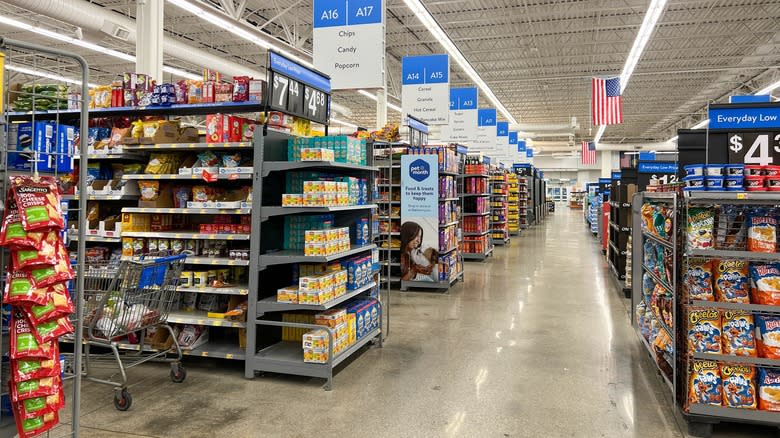
Walmart is one of the top retail grocery chains in the U.S., with over 4,500 stores in operation throughout the country as of April 2024. Though it provides shoppers with unrivaled choice at every location, the huge number of available products offered at each Walmart also greatly increases the chances it will have to issue product recalls.
Now, to its credit, Walmart appears to recognize the need to quickly react when food products are found to be potentially unsafe for human consumption; prompt recalls can be the difference between life and death, after all. Still, like many other retail chains, the company has been forced to issue a number of recalls in recent years (including one of the biggest food recalls of 2024 so far).
While there are many theories as to why these have occurred, there's no denying some product recalls been fairly problematic for the company -- even if it was caused by a manufacturing error unrelated to Walmart itself. No matter the underlying explanation, many of the ensuing recalls have been especially damaging to the store and its image. With that in mind, keep reading as we examine 12 food recalls that will always haunt Walmart.
Read more: The Best Grocery Store In Every State
Peanut Butter Recalled Due To Salmonella Outbreak
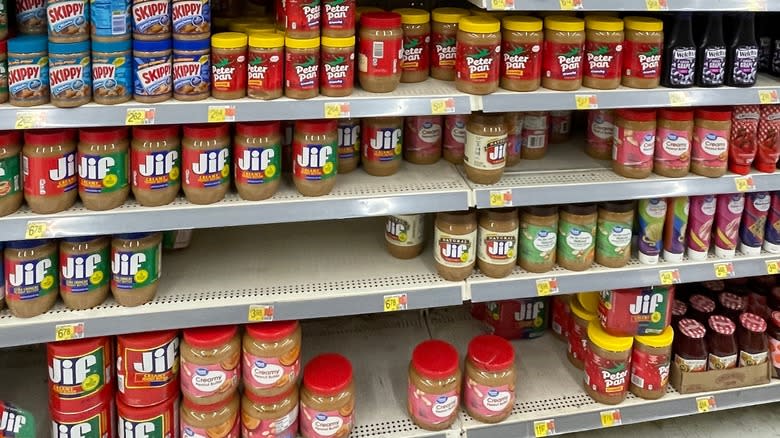
Given how the modern food supply chain is built in the U.S., it's not uncommon for food produced at a single plant to be sold in stores across the country. While this is often the most efficient and cost-effective method, it also increases the likelihood of a nationwide foodborne illness outbreak. This risk was highlighted in 2006, when peanut butter produced by a plant in Georgia infected at least 628 people from 47 states with Salmonella -- leading to recalls being issued for a pair of products sold at Walmart.
Now, no deaths were reported, but two of the most popular peanut butter brands were involved: Peter Pan and Walmart's Great Value. More than that, unopened jars of both Peter Pan and Great Value peanut butter were found to contain Salmonella after testing in early 2007. Following an investigation, it was reported that damp conditions caused by a leaking roof had led to the bacteria growing on peanuts used to make peanut butter.
Eventually, in 2016, it was announced that ConAgra (the company that operated the plant) had agreed to a plea deal settlement payment of over $11 million. The case revolved around whether or not ConAgra had knowingly continued shipping the tainted product despite lab tests having detected Salmonella. Though Walmart wasn't associated with ConAgra's legal troubles following the peanut butter recall, the connection to such practices was likely damaging to its reputation.
Noodles Recalled Due To Mislabelling

Accurate labeling is incredibly important in the food industry. Not only does it provide consumers with vital nutritional information, but it also alerts them to the presence of potential allergens. With that in mind, despite the fact that S&S Cup Saimin contained egg white powder, the common allergen wasn't declared on the label. This led to a recall of just over 37,000 cases of the frozen noodle product in May 2024, including some from a handful of Walmart locations.
Since individuals with egg allergies can develop a variety of serious symptoms upon ingesting egg or egg products (including anaphylaxis), failing to list the ingredient was a potentially fatal mistake. Sun Noodle's S&S Cup Saimin was stocked by various retailers in Hawaii, California, Utah, and Nevada, though Walmart was only required to recall the product from 11 of its Hawaii-based stores.
Thanks to prompt recalls by Walmart and other retailers -- plus a little good luck -- no illnesses appear to have been associated with the consumption of Sun Noodle's S&S Cup Saimin. But considering it was the fourth food recall issued by Walmart in May 2024 alone, it's easy to imagine its reputation took a hit.
Ground Beef Recalled Over E. Coli Concerns
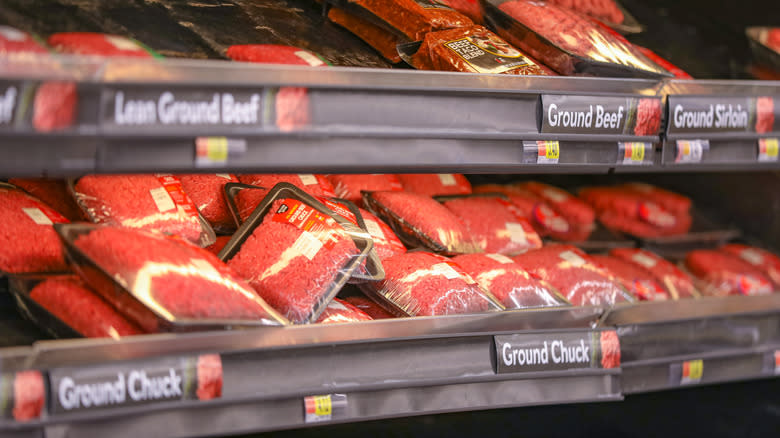
The Escherichia coli bacteria (commonly known as E. coli) associated with beef causes a huge number of foodborne illnesses every year. This bacteria subtype (E. coli O157:H7) can be introduced to the surrounding environment through cattle's manure and may contaminate the meat if the animals aren't properly cleaned after slaughter. This appears to be what happened in May 2024, when Cargill Meat Solutions recalled 16,243 pounds of raw ground beef from Walmart locations over fears the meat had been contaminated with E. coli.
Unfortunately for Walmart, the affected beef was distributed exclusively by the company. As a result, it issued recalls for six different raw ground beef products -- including 93% lean 7% fat all natural lean ground beef, 80% lean 20% fat ground beef chuck, and prime rib steak burgers -- from stores across 12 states. While no illnesses have been reported as a result of these recalled products, this incident is one more reason why ground beef is a meat to avoid at Walmart.
Fruit Recalled Due To Hepatitis A

As a food group that's often eaten raw, fruit poses a significant risk when it comes to foodborne illnesses. This was exemplified in 2023 when contaminated strawberries caused a hepatitis A outbreak that led to 10 reported infections, four hospitalizations, and the recall of several strawberry products from Walmart locations.
An investigation by the Centers for Disease Control and Prevention traced each infection back to strawberries produced by specific farms in Baja California, Mexico. These strawberries were frozen and disturbed to several major retailers, including Walmart, Costco, and Trader Joe's. Though the hepatitis A virus isn't usually fatal, it can result in a number of unpleasant symptoms, and can take weeks or months to fully recover from. Given this, Walmart recalled three products from stores in 32 states in response to the viral outbreak: Great Value Sliced Strawberries, Great Value Mixed Fruit, and Great Value Antioxidant Fruit Blend.
Baby Cereal Recalled Due To High Arsenic Levels
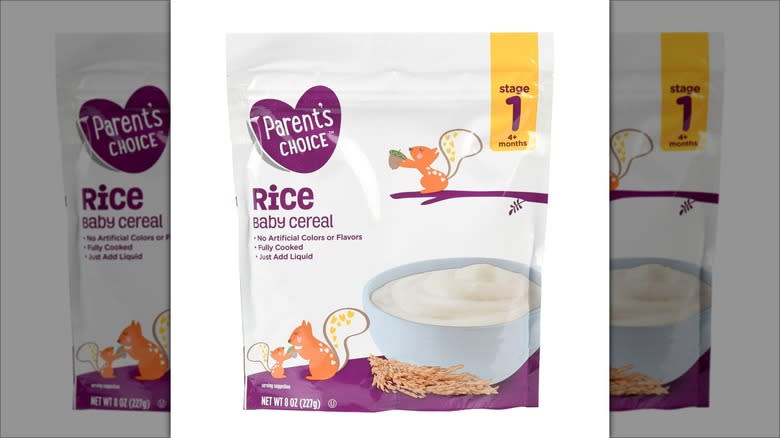
Inorganic arsenic is a toxic heavy metal that often contaminates water in many countries. While harmful to anyone if repeatedly exposed, it can be particularly damaging to the developing bodies and brains of children. This explains why there was such concern when Maple Island announced its Parent's Choice Rice Baby Cereal -- which was only sold at Walmart locations -- had tested above the Food and Drug Administration's guidance for naturally occurring inorganic arsenic in 2021, leading to a recall.
Now, many players in the baby food industry have struggled at times to keep the level of certain heavy metals below the FDA's guidelines. In fact, Brian Ronholm, director of food policy at Consumer Reports, noted in 2021 that "baby food manufacturers should consider pulling infant rice cereal from the market until they are able to implement effective mitigation measures to address inorganic arsenic." This is exactly what Maple Island did, recalling products from Walmart stores nationwide as a result.
In this instance, the high levels of arsenic may have been attributable to the presence of rice in the cereal, as the crop is known to contain significant levels of the metal. Although no illnesses were reported, many parents feared they had fed their children potentially harmful food, which likely continues to haunt those families (and Walmart).
Candy Recalled Over Salmonella Concerns
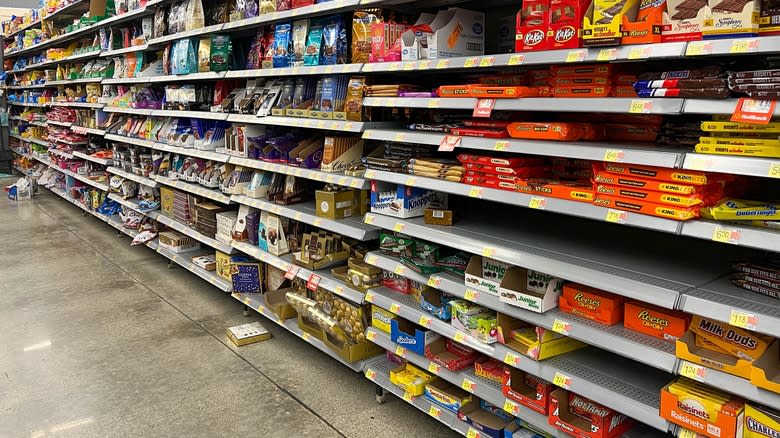
Palmer Candy is a major supplier of confections in the U.S., with products carried by retailers such as Walmart, Hy-Vee, and Target. Of course, being such a large company, it relies on a long, interconnected, nationwide chain for both production and distribution, which presents a risk. After all, a single mishap can impact the entire process, which is precisely what happened in May 2024 when Palmer issued a nationwide recall that included items sold at Walmart.
The recall occurred after Palmer Candy's liquid coating supplier received notice that an ingredient used in certain coatings could be contaminated with Salmonella. Consequently, the company recalled any and all of its confectionary items that were covered with a white coating. Walmart (along with other affected retail companies) acted swiftly, recalling a huge variety of coated snacks, candies, and other confectioneries. Overall, 32 Palmer Candy products were recalled, and though no illnesses have been reported in association with the contaminated products, it's easy to imagine the recall still haunts Walmart.
Multiple Salads Recalled Due Listeria Outbreak
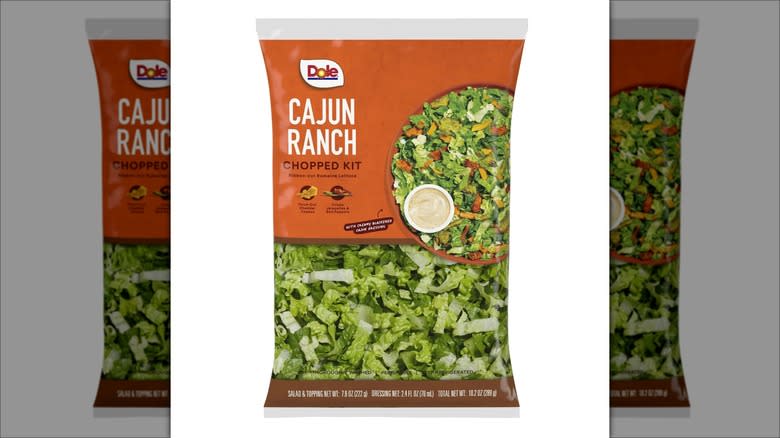
Listeria monocytogenes is a type of bacteria that (if ingested) can cause listeriosis. If this disease spreads beyond the gut, it becomes known as invasive listeriosis: a serious illness that causes flu-like symptoms and, on average, kills one in every 20 people who contract it. Since listeriosis is also extremely dangerous for newborn children, Rizo-López Foods was forced to issue a recall in February 2024 for all of its cheese and dairy products over concerns they were contaminated -- with Walmart alone being forced to recall nine different salad kit products (including a ranch salad kit).
Upon investigation, it was discovered that the specific Listeria strain responsible for this outbreak had actually been present since 2014 -- suggesting the same food had been making Americans sick for nearly a decade. During this time, 26 people were reportedly infected. Moreover, as a result of listeriosis, 23 of those individuals were hospitalized, with two passing away, and one person suffering a pregnancy loss. These tragedies will undoubtedly haunt Walmart -- as they will every other brand involved -- for many years to come.
Pancake And Waffle Mix Recalled Due To Foreign Objects
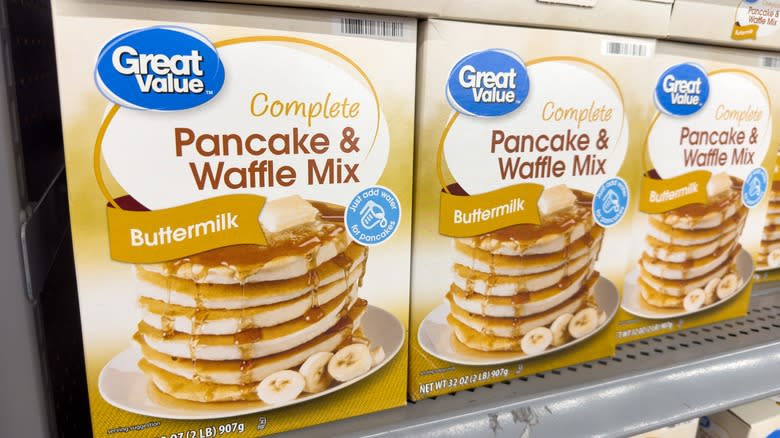
Pathogens and allergens are not the only reasons why food is recalled. In fact, many food products end up recalled because they contain inedible objects that were erroneously introduced during the manufacturing process, which is exactly what happened in 2022 at Walmart. That year, Continental Mills recalled Walmart's Great Value Buttermilk Pancake & Waffle Mix (along with Kroger's Buttermilk Pancake & Waffle Mix) because it contained fragments of a cable.
Foreign objects like those found in the recalled pancake mix from Walmart pose a clear risk due to the potential to lacerate, choke, or otherwise injure unsuspecting consumers. Thankfully, no customers reported finding cable fragments in their Great Value Buttermilk Pancake & Waffle Mix and there were no reported injuries -- quite the escape considering the pancake mix was distributed by Walmart nationwide. Then again, the fear of encountering these foreign objects may have turned some customers off from purchasing the Great Value Buttermilk Pancake & Waffle Mix, if not buttermilk pancakes entirely.
Baby Formula Recalled Due To Bacteria
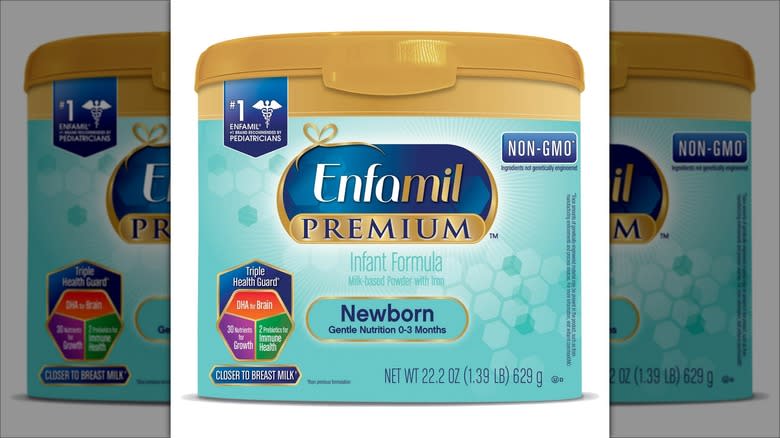
While everyone is vulnerable to foodborne illness, those with weakened or underdeveloped immune systems are particularly at risk. A contamination can have potentially fatal consequences for such individuals, after all, so certain products, like baby formula, are usually manufactured under strict guidelines. Retailers may exercise extra caution with such items, as well, which likely led Walmart to remove one baby formula product from shelves in 2011 -- despite no official recall having been issued.
The recall occurred after the tragic death of 10-day-old Avery Cornett in December 2011, who had contracted a Cronobacter sakazakii infection. Since Cornett had consumed Enfamil Premium Newborn Powder prior to his death, some suspected this had caused his illness, given the Cronobacter sakazakii bacteria has previously been linked with contaminated baby formula. Testing by the FDA, CDC, and the manufacturer (Mead Johnson Nutrition Co.) found no evidence of the bacteria in the powder, and no formal recall was issued. However, Walmart took the decision to recall one type of Enfamil Premium Newborn Powder from stores across 49 states.
In the aftermath, several families (including Cornett's parents) tool Mead Johnson to court, seeking damages for negligence and product liability amongst others. While Walmart wasn't involved in the lawsuit in any way, the horrific nature of the entire series of events undoubtedly haunts all parties involved.
Ground Turkey Recalled Due To Salmonella Concerns
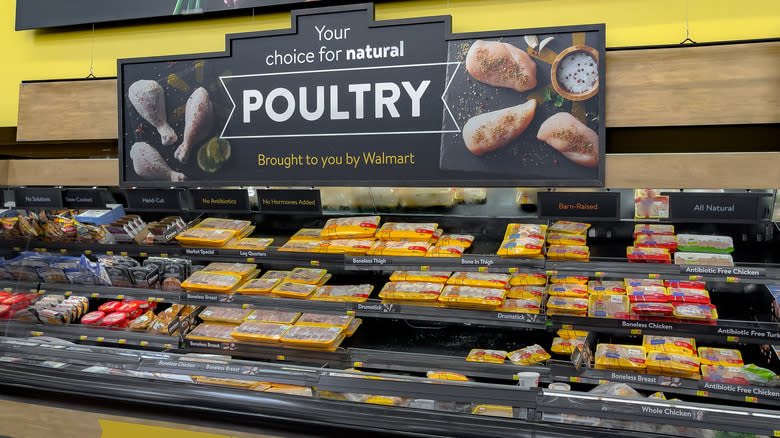
In August 2011, Cargill Solutions issued a recall for 36 million pounds of ground turkey products over fears the poultry product was contaminated with Salmonella. While the entirety of this contaminated meat came from one facility in Arkansas, it was distributed across the U.S. at a number of stores, including Walmart locations.
What made this recall all the more concerning was that the specific strain of Salmonella was resistant to several different drugs, making infections more complicated to treat. The resulting outbreak was predictably damaging: 79 people were infected, with 22 requiring hospitalization -- and one person even dying as a result of the Salmonella infection. Illnesses were recorded across 26 states, making this a particularly widespread outbreak. Although retail chains such as Walmart did everything possible to minimize the spread, the public was rightly outraged by the extent of this outbreak, which will always haunt the company.
Romaine Lettuce Recalled Due To E. Coli

Romaine lettuce is particularly suited to charring -- if it's safe to eat. Unfortunately, in November 2020, supplier Tanimura & Antle Inc. issued a voluntary recall for romaine lettuce heads that were believed to be contaminated with E. coli (specifically E. coli O157:H7). A total of 3,396 cartons of lettuce were recalled from retailers in 20 states, and approximately 1,000 Walmart stores were involved.
This wasn't the first lettuce recall for Walmart. In fact, there have been several other recalls involving romaine lettuce over the years, which may be because of the ease with which E. coli bacteria can contaminate the vegetable. After all, as food safety research and testing expert, James E. Rogers, told Consumer Reports in 2020, "By the time growers combine multiple batches of lettuce, mix it around, rinse it, and wash it, that little bit of bacteria may spread over a lot of lettuce."
While the 2020 outbreak was not the largest of Walmart's lettuce-related recalls, it may have been one of the most publicly damaging. Many angry customers took to Reddit to complain about yet another lettuce recall. Some even held up the recall as proof that people shouldn't buy fresh produce at Walmart -- hardly the kind of response you want to see as a grocery store brand.
Chia Seeds Recalled Because Of Salmonella
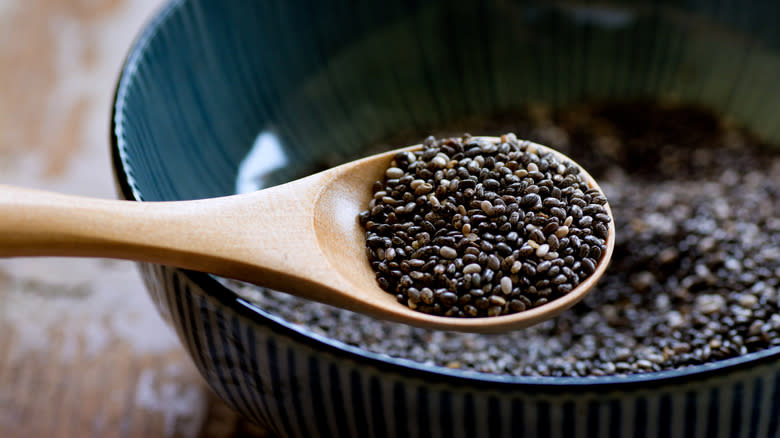
Another food product Walmart recalled in May 2024 was its Great Value Organic Black Chia Seeds. This was voluntarily recalled by Natural Sourcing International, the product's supplier, over concerns the seeds were contaminated with Salmonella. The recall was issued nationwide, though only Walmart stores appear to have been impacted.
One of the main concerns with this food recall revolved around the product's distant expiration date. The recalled chia seeds aren't set to expire until October 2026, meaning customers who are unaware of the recall may continue to store -- and eventually eat -- the contaminated product. Both National Sourcing International and Walmart have tried to raise awareness of the recall as best as possible. Of course, since some have raised concerns that grocery store brands aren't as effective as possible when it comes to notifying customers about recalls, the risk of customers falling ill due to contaminated chia seeds in the future continues to exist for Walmart.
Read the original article on The Daily Meal.

 Yahoo News
Yahoo News 
